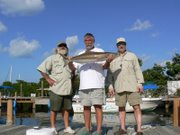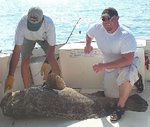Okay, I apologize for the contamination of the fishing blog temporarily while I try to hash out the best wording for my indignant rage inspired by arrogant buttholes employed by my government.
For a little background, I wrote this article, Can the United States Government can Steal your Intellectual Property? The article is confusing to many since I am a suckie writer and you have to follow the links put everything in perspective. I feel very strongly this situation should be addressed to prevent the rights of little guys from being stomped on by idiots in our government. Not all government employees are idiots, so I am inviting one that is not an idiot to review my next article before it is published. Feel free to add your own comments if you like. Here is the [second]draft for the next article:
In, Can the United States Government Steal Your Intellectual Property, two points were tried to be made, the theft - copyright infringement and ethical misbehavior by government employed climate scientists. To reduce confusion we will separate the two:
The Theft
Anthony Watts a semi-retired meteorologist started a grass root effort to survey the condition and siting of the surface weather stations in the United States, believing that poor siting could produce significant errors in the temperature data used to evaluate global warming. Volunteers were used to collect data for the surfacestations.org survey. The collection site had properly maintained notice of copyright and published intent of use for the data collected. Toward the completion of the survey, the station data was used by scientists working for the National Climatic Data Center (NCDC), a branch the National Oceanographic and Atmospheric Administration (NOAA) before Mr. Anthony Watts, could publish his work. The actions of the NCDC employees constitutes copyright infringement, which a theft of intellectual property.
Scientists at NCDC stole the data and a scientist, Dr. Gavin Schmidt, at the National Aeronautics and Space Administration's (NASA) Goddard Institute of Space Studies (GISS) believes there was no theft because data is not protected by copyright once published.
Should Mr. Watts have any expectation of protection of his unique research from employees of the United States Government?
This ruling differentiated protected versus unprotected databases like the telephone white pages (unprotected) and the yellow pages (protected). So what is a minimal level of creativity for a database to legally be considered a “creative database”? Inclusion of graphics of any kind is enough to make the database creative. Graphics have a separate distinction in copyright law.
Mr. Watts' creative database was a pictorial survey of the weather stations. Each photograph is afforded copyright protection. The collection of the photographs in the survey form a creative database that the supreme court has ruled is protected under the Copyright Act. Even without a copyright notification on the site, the creative data and each photograph is protected since the United States joined in the Berne Convention for the Protection of Literary and Artistic Works. [2]
While the database has copyright protection there are “fair use” rules that allow educators, journalists and others, limited rights to uses portions of copyright protected works. From Wikipedia, “While fair use explicitly applies to use of copyrighted work for criticism, news reporting, teaching, scholarship, or research purposes, the defense is not limited to these areas.” [3] The NCDC could have assumed their use was allowable as “fair use”.
Since Mr. Watts' compilation was creative he should have expected legal protection for database. Some of Mr. Watts' survey was used by the NCDC under fair use and what Mr. Watts assumed was an agreement in principal to publish a joint paper. Mr. Watts protested that use after the NCDC published a paper that came as a surprise to Mr. Watts.
“The appearance of the Menne et al 2010 paper was a bit of a surprise, since I had been offered collaboration by NCDC’s director in the fall. In typed letter on 9/22/09 Tom Karl wrote to me:
“We at NOAA/NCDC seek a way forward to cooperate with you, and are interested in joint scientific inquiry. When more or better information is available, we will reanalyze and compare and contrast the results.”
“If working together cooperatively is of interest to you, please let us know.” “[4]
Mr. Watts offered to include the NCDC as collaborator in his (Watts et al.) paper:
“On November 10th, 2009, I sent a reply letter via Federal Express to Mr. Karl, advising him that we would like to collaborate, and offered to include NCDC in our paper.. In that letter I also reiterated my concerns about use of the preliminary surfacestation data (43% surveyed) that they had, and spelled out very specific reasons why I didn’t think the results would be representative nor useful.
We all waited, but there was no reply from NCDC to our reply to offer of collaboration by Mr. Karl from his last letter. Not even a “thank you, but no”.[4]
Fair use would not apply in this case since the Menne et al could not be considered a criticism as there was no published paper to critic. Teaching, scholarship and research would not have benefited from the Menne et al paper unless their paper was intended to show an extreme example of poor academic conduct. Stealing data prior to the publishing of a scholarly paper is not fair use if the stole data is used to preemptively publish a scholarly paper. That would be the antithesis of fair use!
Dr. Roger Pielki, Sr. wrote a post on his blog, Climate Science: Dr. Roger Pielki, Sr., containing the following:
“The publication of the Menne et al 2010 paper violates the professional courtesy that is standard practice by other scientific groups. We had even offered them co-authorship on our papers, so that we can benefit from their scientific expertise and they can benefit from ours. They refused.
This failure by NCDC to honor professional standards is just another example of the lack of accepted professional standards at this federal climate laboratory. They should have joined us in a paper, or, as an appropriate alternative, waited until we published and then complete their analysis.” [5]
The NCDC continued to use Mr. Watts copyright protected data despite the valid protests lodged concerning the Menne et al 2010 paper. More Dirty Pool by NCDC's Karl, Menne and Peterson, was posted by Mr. Watts on September 23, 2010 over more violations of copyright. [6]
Mr. Watts complained of use and attribution was added after the fact by Menne et al. Mr. Watts stated on his blog, “Of course I could have been a jerk about it and demanded all sorts actions via formal complaints, copyright claims, etc. But I didn’t. It simply didn’t rise to that level.”[7]
Had Mr. Watts not been so kind, the courts would have had the final say as to how “fair” NCDC's interpretation of fair use actually is. Can the United States Government Steal Your Intellectual Property? Yes, at least until the courts straighten out NCDC employee's warped understanding of the Copyright Act of 1976.
[2] http://en.wikipedia.org/wiki/Berne_Convention_for_the_Protection_of_Literary_and_Artistic_Works
[3] http://en.wikipedia.org/wiki/Copyright_Act_of_1976
[4] http://wattsupwiththat.com/2010/01/27/rumours-of-my-death-have-been-greatly-exaggerated/
Oh, I do have a trip coming up so I will post a real fishing related something soon.
Marathon in the Florida Keys should be your next fishing vacation destination. Join us for charter fishing, fishing guide trips or our fishing 101 so you can fish on your own with better success.
Tight lines,
Capt. Dallas



No comments:
Post a Comment